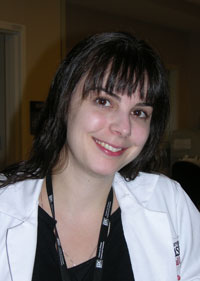 |
Jennifer Oakes, M.D. |
Dr. Oakes, who also is assistant professor of emergency medicine, had been serving as assistant medical director of the center since July 2005 when she joined UNMC.
“I am very excited about this appointment. It is a great opportunity to move the center forward,” she said.
The Nebraska Regional Poison Center (NRPC) is a free, 24-hour emergency telephone service designed to assess and give treatment recommendations during possible poisonings.
NRPC receives about 39,000 incoming phone calls per year, and follow-up calls are made on a significant portion of total calls to the center.
Calls originate from both health care professionals and the public throughout Nebraska, Wyoming, American Samoa and the Federated States of Micronesia.
A staff of 15 registered nurses — including 13 who are certified Specialists in Poison information (SPI) — answer the phones and provide information to the public and health care providers. A nurse educator provides local and regional education programs as well.
Dr. Oakes and Claudia Barthold, M.D., assistant medical director of the poison center, and assistant professor, emergency medicine, work together on a variety of levels.
They provide professional education programs, are available 24-hours-a-day by phone to health care providers throughout NRPC’s coverage areas and provide bedside consultations at The Nebraska Medical Center, Creighton University Medical Center and Children’s Hospital.
Also, they conduct research in the field of clinical toxicology and are first responders during hazardous materials incidents.
Toxicology rotations are available through the center for students and healthcare providers.
Robert Muelleman, M.D., professor and chairman of emergency medicine, said Dr. Oakes “has a passion for toxicology, which I think is the most important character trait for a poison center medical director.
“The poison center has a long history, is well managed, and has excellent nurses who are specialized in providing poison information. I think Dr. Oakes will utilize these resources and continue to look for opportunities to educate medical professionals and the lay public about toxicology issues.”
Dr. Oakes has identified four goals for the center:
- Expand educational offerings;
- Move to a bigger space within the next two years;
- Recruit a third medical toxicologist; and
- Expand clinical responsibilities.
“We’re also formalizing a relationship with the Henry Doorly Zoo to provide its employees with care and services in cases of snake bites by poisonous snakes,” she said. Drs. Oakes and Barthold hold volunteer positions at the zoo.
Dr. Oakes is involved in developing the Antivenom Index for the U.S. Department of Health and Human Services and consults with the zoo regarding the local storage and use of non-native antivenom.
USA Today reports that bites from non-native snakes — often more lethal than native snake bites — are rare but on the rise. In 1996, there were 33 such bites; in 2004, the latest year for which statistics are available, there were 52.
In operation since 1957, the center recently celebrated 50 years of service. Among the first 10 poison centers in the country, it is certified by the American Association of Poison Control Centers. It is supported through a cooperative agreement between UNMC; its hospital partner, The Nebraska Medical Center; and Creighton University Medical Center, with additional support from the State of Nebraska and federal government.
The center is a critical component of the nation’s public health system. Nationwide, more than 2 million poisonings are reported each year to the 61 Poison Control Centers (PCCs) across the country. More than 90 percent of these poisonings occur in the home. The majority of non-fatal poisonings occur in children younger than six years old. Poisonings are one of the leading causes of death among adults.
A native of Albany, N.Y., Dr. Oakes received her medical degree from the State University of New York, Syracuse, in 2000. She then did a residency in emergency medicine at Beth Israel Deaconess Medical Center, Boston — a teaching hospital for Harvard Medical School.
She completed subspecialty training in medical toxicology at the CDC/ATSDR- Emory University/Georgia Poison Center joint fellowship in medical toxicology. She is board certified in both emergency medicine and medical toxicology.